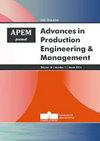求助PDF
{"title":"过度自信与公平关注对供应链绩效的交互影响","authors":"Z. J. Zhang, P. Wang, M. Wan, J. H. Guo, C. Luo","doi":"10.14743/apem2020.3.365","DOIUrl":null,"url":null,"abstract":"For exploring the interactive impacts of overconfidence and fairness concern on optimal decisions of manufacturer and retailer, we establish Stackelberg models with these two behavioural preferences in a two‐echelon supply chain, wherein retailer has two behavioural preferences. The optimal equilibrium results are compared in different scenarios, namely the retailer with no be‐ havioural preference, with single‐behavioural preference and with the two behavioural preferences. Although previous literatures have proven that overconfidence or fairness concern has a negative influence on retailer, we find that the retailer always benefits from these two behavioural preferences, whether it is retail price, sales effort or utility. This is because when the over‐ confident degree is within a reasonable range, overconfidence and fairness concern have a positive influence on retailer's decision‐making, and when the overconfident degree is high, the fairness concern preference can suppress the adverse effects caused by overconfidence. Compared with the preference of fairness concern, the overconfident preference plays a leading role in supply chain performance, which mainly manifests in retailer’s decisions, utility and manufacturer profit. Moreover, the wholesale price and profit of the rational manufacturer may become worsen due to the fairness concern of retailer. © 2020 CPE, University of Maribor. All rights reserved.","PeriodicalId":48763,"journal":{"name":"Advances in Production Engineering & Management","volume":"28 1","pages":"277-294"},"PeriodicalIF":2.8000,"publicationDate":"2020-09-27","publicationTypes":"Journal Article","fieldsOfStudy":null,"isOpenAccess":false,"openAccessPdf":"","citationCount":"4","resultStr":"{\"title\":\"Interactive impacts of overconfidence and fairness concern on supply chain performance\",\"authors\":\"Z. J. Zhang, P. Wang, M. Wan, J. H. Guo, C. Luo\",\"doi\":\"10.14743/apem2020.3.365\",\"DOIUrl\":null,\"url\":null,\"abstract\":\"For exploring the interactive impacts of overconfidence and fairness concern on optimal decisions of manufacturer and retailer, we establish Stackelberg models with these two behavioural preferences in a two‐echelon supply chain, wherein retailer has two behavioural preferences. The optimal equilibrium results are compared in different scenarios, namely the retailer with no be‐ havioural preference, with single‐behavioural preference and with the two behavioural preferences. Although previous literatures have proven that overconfidence or fairness concern has a negative influence on retailer, we find that the retailer always benefits from these two behavioural preferences, whether it is retail price, sales effort or utility. This is because when the over‐ confident degree is within a reasonable range, overconfidence and fairness concern have a positive influence on retailer's decision‐making, and when the overconfident degree is high, the fairness concern preference can suppress the adverse effects caused by overconfidence. Compared with the preference of fairness concern, the overconfident preference plays a leading role in supply chain performance, which mainly manifests in retailer’s decisions, utility and manufacturer profit. Moreover, the wholesale price and profit of the rational manufacturer may become worsen due to the fairness concern of retailer. © 2020 CPE, University of Maribor. All rights reserved.\",\"PeriodicalId\":48763,\"journal\":{\"name\":\"Advances in Production Engineering & Management\",\"volume\":\"28 1\",\"pages\":\"277-294\"},\"PeriodicalIF\":2.8000,\"publicationDate\":\"2020-09-27\",\"publicationTypes\":\"Journal Article\",\"fieldsOfStudy\":null,\"isOpenAccess\":false,\"openAccessPdf\":\"\",\"citationCount\":\"4\",\"resultStr\":null,\"platform\":\"Semanticscholar\",\"paperid\":null,\"PeriodicalName\":\"Advances in Production Engineering & Management\",\"FirstCategoryId\":\"5\",\"ListUrlMain\":\"https://doi.org/10.14743/apem2020.3.365\",\"RegionNum\":3,\"RegionCategory\":\"工程技术\",\"ArticlePicture\":[],\"TitleCN\":null,\"AbstractTextCN\":null,\"PMCID\":null,\"EPubDate\":\"\",\"PubModel\":\"\",\"JCR\":\"Q2\",\"JCRName\":\"ENGINEERING, MANUFACTURING\",\"Score\":null,\"Total\":0}","platform":"Semanticscholar","paperid":null,"PeriodicalName":"Advances in Production Engineering & Management","FirstCategoryId":"5","ListUrlMain":"https://doi.org/10.14743/apem2020.3.365","RegionNum":3,"RegionCategory":"工程技术","ArticlePicture":[],"TitleCN":null,"AbstractTextCN":null,"PMCID":null,"EPubDate":"","PubModel":"","JCR":"Q2","JCRName":"ENGINEERING, MANUFACTURING","Score":null,"Total":0}
引用次数: 4
引用
批量引用
Interactive impacts of overconfidence and fairness concern on supply chain performance
For exploring the interactive impacts of overconfidence and fairness concern on optimal decisions of manufacturer and retailer, we establish Stackelberg models with these two behavioural preferences in a two‐echelon supply chain, wherein retailer has two behavioural preferences. The optimal equilibrium results are compared in different scenarios, namely the retailer with no be‐ havioural preference, with single‐behavioural preference and with the two behavioural preferences. Although previous literatures have proven that overconfidence or fairness concern has a negative influence on retailer, we find that the retailer always benefits from these two behavioural preferences, whether it is retail price, sales effort or utility. This is because when the over‐ confident degree is within a reasonable range, overconfidence and fairness concern have a positive influence on retailer's decision‐making, and when the overconfident degree is high, the fairness concern preference can suppress the adverse effects caused by overconfidence. Compared with the preference of fairness concern, the overconfident preference plays a leading role in supply chain performance, which mainly manifests in retailer’s decisions, utility and manufacturer profit. Moreover, the wholesale price and profit of the rational manufacturer may become worsen due to the fairness concern of retailer. © 2020 CPE, University of Maribor. All rights reserved.


